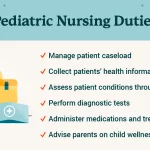Have you ever wondered what it takes to become a nurse practitioner?
The path to becoming a nurse practitioner is not as straightforward as one might think. It involves a series of educational requirements, certifications, and clinical experience.
The truth is, the journey to becoming a nurse practitioner can be challenging, but the rewards are well worth it.
So, if you’re interested in pursuing a career as a nurse practitioner, keep reading to discover the educational requirements and steps you need to take to achieve your goal.
Overview of Nurse Practitioner Education
To become a nurse practitioner, you must complete a rigorous educational program that includes advanced coursework and hands-on clinical training.
The first step in your journey towards becoming a nurse practitioner is obtaining a Bachelor of Science in Nursing (BSN) degree. This typically takes around four years to complete and provides you with a solid foundation in nursing theory, skills, and clinical practice.
Once you have obtained your BSN, you can then pursue a Master of Science in Nursing (MSN) degree with a specialization in the nurse practitioner field of your choice. During your MSN program, you’ll delve deeper into advanced nursing concepts and gain the knowledge and skills necessary to provide primary and specialized healthcare services to patients of all ages.
The coursework will cover a wide range of topics, including pathophysiology, pharmacology, advanced health assessment, and differential diagnosis. Additionally, you’ll also receive hands-on clinical training, which is an integral part of your education as a nurse practitioner.
This clinical training allows you to apply the knowledge and skills you have learned in a real-world setting under the supervision of experienced healthcare professionals. It provides you with the opportunity to develop your clinical judgment, critical thinking, and patient management skills.
The duration of the clinical training will vary depending on the program and specialization you choose.
Bachelor’s Degree in Nursing (BSN) Requirements
Obtaining a Bachelor’s Degree in Nursing (BSN) is an essential requirement for individuals aspiring to become nurse practitioners. To meet the BSN requirements, you must first complete a high school diploma or GED equivalent. Once you have met this prerequisite, you can then enroll in a four-year BSN program at an accredited college or university.
During your BSN program, you’ll undergo comprehensive training in various areas of nursing practice. This includes coursework in anatomy, physiology, pharmacology, nursing theory, and clinical practice. The program will also provide you with hands-on experience through supervised clinical rotations in different healthcare settings.
In addition to the academic coursework, most BSN programs require you to maintain a minimum GPA and complete a certain number of clinical hours. These requirements ensure that you have acquired the necessary knowledge and skills to provide quality care to patients.
Upon completion of the BSN program, you’ll be eligible to take the National Council Licensure Examination for Registered Nurses (NCLEX-RN). Passing this exam is a prerequisite for obtaining your registered nursing license.
Master’s Degree in Nursing (MSN) Programs
If you’re looking to advance your nursing career, consider pursuing a Master’s Degree in Nursing (MSN) program. An MSN program is designed to provide advanced knowledge and skills in nursing practice, leadership, and research. It can open up a wide range of career opportunities, including becoming a nurse practitioner (NP), nurse educator, nurse administrator, or clinical nurse specialist.
To enroll in an MSN program, you typically need to hold a Bachelor of Science in Nursing (BSN) degree and have a valid registered nurse (RN) license. Some programs may also require a minimum GPA and a certain amount of clinical experience. The duration of an MSN program can vary, but it generally takes about two to three years to complete.
In an MSN program, you’ll take courses that delve deeper into the theoretical and practical aspects of nursing. These courses may cover topics such as advanced health assessment, pharmacology, pathophysiology, research methods, and healthcare policy. Additionally, you’ll have the opportunity to specialize in a specific area of nursing, such as family practice, pediatrics, or geriatrics.
Upon completion of an MSN program, you’ll be eligible to take the national certification exam in your chosen specialty. This certification is often required for advanced practice nursing roles and can enhance your job prospects and earning potential.
Accreditation and Certification Requirements
Ensure that you meet the accreditation and certification requirements to advance your nursing career. Accreditation is an important aspect of nurse practitioner education, as it ensures that the program meets the standards set by professional nursing organizations and regulatory bodies. When choosing a nurse practitioner program, make sure it’s accredited by a recognized accrediting agency, such as the Commission on Collegiate Nursing Education (CCNE) or the Accreditation Commission for Education in Nursing (ACEN). This will ensure that the program meets the necessary educational standards and will provide you with the knowledge and skills needed to become a competent nurse practitioner.
Certification is another essential requirement for nurse practitioners. After completing an accredited nurse practitioner program, you must pass a national certification exam to become certified in your chosen specialty. Certification is typically offered by professional nursing organizations, such as the American Nurses Credentialing Center (ANCC) or the Pediatric Nursing Certification Board (PNCB). It demonstrates that you have met the standards of competence and are qualified to practice as a nurse practitioner in your chosen specialty.
Meeting the accreditation and certification requirements is crucial for advancing your nursing career. It not only ensures that you receive a quality education but also validates your expertise and competence as a nurse practitioner. By meeting these requirements, you’ll be well-prepared to provide high-quality and evidence-based care to your patients and contribute to the advancement of the nursing profession.
Clinical Experience and Practicum Hours
To gain practical skills and hands-on experience, nurse practitioner education programs require you to complete a specified number of clinical experience and practicum hours. These hours are crucial for your development as a competent and confident nurse practitioner.
During your clinical experience, you’ll have the opportunity to apply the knowledge and theory you have learned in the classroom to real-life patient care situations. This is where you’ll gain valuable skills in assessment, diagnosis, treatment, and management of various health conditions. Under the guidance of experienced preceptors, you’ll learn to navigate the complexities of healthcare delivery and develop critical thinking and decision-making abilities.
The number of clinical experience and practicum hours required may vary depending on the program and specialty you choose. However, most programs adhere to the guidelines set by accrediting bodies and professional organizations. These guidelines ensure that you receive adequate exposure to different patient populations and healthcare settings to build a diverse skill set.
Completing the required clinical hours may involve rotations in various clinical settings such as hospitals, primary care clinics, specialty clinics, and community health centers. You may also have the opportunity to work with diverse patient populations, including children, adults, and older adults.
Specialization Options for Nurse Practitioners
There are various specialization options available for nurse practitioners to further enhance their skills and expertise. Choosing a specialization allows nurse practitioners to focus on a specific area of healthcare and provide specialized care to patients.
One common specialization option is Family Nurse Practitioner (FNP). FNPs are trained to provide primary care to patients of all ages, from infants to the elderly. They can diagnose and treat common illnesses, manage chronic conditions, and provide preventive care.
Another specialization option is Adult-Gerontology Nurse Practitioner (AGNP). AGNPs specialize in caring for adults and elderly patients, focusing on managing chronic conditions and promoting healthy aging.
Other specialization options include Pediatric Nurse Practitioner (PNP) for those who want to work with children, Psychiatric-Mental Health Nurse Practitioner (PMHNP) for those interested in mental health, and Women’s Health Nurse Practitioner (WHNP) for those who want to focus on women’s health issues.
These specializations allow nurse practitioners to develop advanced knowledge and skills in their chosen field, providing specialized care and improving patient outcomes.
Continuing Education and Professional Development
Continuing education and professional development play a crucial role in the growth and advancement of your knowledge and skills as a nurse practitioner. As healthcare practices and technologies continue to evolve, it’s essential to stay current and updated in your field. Engaging in ongoing education allows you to expand your expertise, improve patient outcomes, and provide the highest quality of care.
Continuing education opportunities for nurse practitioners can take various forms, including attending conferences, seminars, workshops, and webinars. These events provide opportunities for you to learn about the latest research, advancements, and best practices in your specialty area. Additionally, they offer networking opportunities, allowing you to connect with other professionals in the field and exchange knowledge and experiences.
Professional development activities, such as obtaining certifications and participating in research projects, can also enhance your skills and expertise. Certifications demonstrate your commitment to continuous learning and validate your proficiency in a specific area of practice. Engaging in research projects allows you to contribute to the body of knowledge in nursing and further develop your critical thinking and problem-solving skills.
Continuing education and professional development aren’t only beneficial for your career growth but also for the overall improvement of patient care. By staying up-to-date with the latest evidence-based practices and advancements in your field, you can provide the highest level of care and make informed decisions that positively impact patient outcomes. Therefore, it’s essential to prioritize and invest in your ongoing education and professional development as a nurse practitioner.
State Licensure and Certification Exams
Passing state licensure and certification exams is a crucial step in becoming a nurse practitioner. These exams are designed to assess your knowledge, skills, and abilities in order to ensure that you’re competent and qualified to provide high-quality healthcare to patients. Each state has its own specific requirements for licensure and certification, so it’s important to familiarize yourself with the regulations in the state where you plan to practice.
To become licensed as a nurse practitioner, you’ll typically need to pass the National Council Licensure Examination for Registered Nurses (NCLEX-RN) as well as a state-specific nurse practitioner certification exam. The NCLEX-RN is a comprehensive exam that evaluates your understanding of the basic principles of nursing practice. Once you have successfully passed this exam, you can then proceed to take the nurse practitioner certification exam, which tests your knowledge and skills in your chosen specialty area.
It is important to note that the requirements for licensure and certification exams may vary depending on the state. Some states may require additional exams or have different passing scores. Therefore, it’s essential to research and understand the specific requirements in the state where you plan to practice as a nurse practitioner.
Tips for Choosing the Right Nurse Practitioner Program
When selecting a nurse practitioner program, it’s important to consider various factors to ensure you make the right choice. The first thing to consider is accreditation. Look for programs that are accredited by the appropriate accrediting bodies, such as the Accreditation Commission for Education in Nursing (ACEN) or the Commission on Collegiate Nursing Education (CCNE). Accreditation ensures that the program meets certain quality standards and will provide you with a solid education.
Next, consider the curriculum and specialization options. Look for programs that offer a curriculum that aligns with your career goals and interests. Some programs may offer specialized tracks or concentrations that allow you to focus on a specific area of practice, such as family medicine or pediatrics. Consider your long-term career goals and choose a program that will help you achieve them.
Another important factor to consider is the clinical rotation opportunities. Clinical experience is a crucial part of nurse practitioner education, as it allows you to apply what you have learned in a real-world setting. Look for programs that offer a wide variety of clinical rotation sites and opportunities to work with diverse patient populations.
Lastly, consider the program’s reputation and faculty. Look for programs that have a strong reputation in the healthcare community and faculty members who are experienced and knowledgeable in their field. You want to learn from the best and be confident that you’re receiving a quality education.
Frequently Asked Questions
What Is the Average Salary of a Nurse Practitioner?
The average salary for a nurse practitioner is around $110,000 per year. With your skills and experience, you could earn a competitive salary in a rewarding career helping others in the medical field.
Are There Any Scholarships or Financial Aid Options Available for Nurse Practitioner Students?
Yes, there are scholarships and financial aid options available for nurse practitioner students. You should research and apply for these opportunities to help alleviate the financial burden of your education.
Can Nurse Practitioners Prescribe Medication?
Yes, nurse practitioners can prescribe medication. They have the authority to write prescriptions and provide medication management for their patients, allowing them to play a crucial role in healthcare.
How Long Does It Typically Take to Complete a Nurse Practitioner Program?
It typically takes around 2-3 years to complete a nurse practitioner program. During this time, you will gain the necessary knowledge and skills to provide advanced healthcare services as a nurse practitioner.
What Are the Job Prospects for Nurse Practitioners in Different Healthcare Settings?
In different healthcare settings, job prospects for nurse practitioners are generally positive. They have opportunities in hospitals, clinics, private practices, and more. With the growing demand for healthcare, the need for nurse practitioners continues to rise.
Conclusion
So, if you’re considering becoming a nurse practitioner, you’ll need to meet certain education requirements. This includes obtaining a Bachelor’s Degree in Nursing (BSN) and a Master’s Degree in Nursing (MSN).
Additionally, you’ll need to complete clinical experience and practicum hours, choose a specialization, and stay up-to-date with continuing education.
Don’t forget to also obtain state licensure and certification exams.
With the right program and dedication, you can embark on an exciting and rewarding career as a nurse practitioner.


